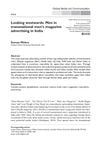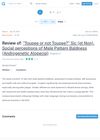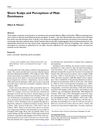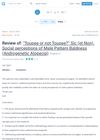 1 citations,
December 2024 in “Qeios”
1 citations,
December 2024 in “Qeios” Hair loss affects attractiveness but can suggest intelligence, and face perception is complex, involving factors like age and smile.

Men with hair loss are seen as less attractive and shorter, and height is a key factor in attractiveness ratings.

Wearing a toupee makes men seem more attractive and slightly healthier, but doesn't change how confident they appear.
[object Object] 
Taller men are seen as more attractive, and hair loss negatively affects attractiveness.
 138 citations,
October 2012 in “Behavioral Ecology”
138 citations,
October 2012 in “Behavioral Ecology” Masculine facial features may not reliably indicate heritable health, and more research is needed.
 2 citations,
October 2017 in “Global Media and Communication”
2 citations,
October 2017 in “Global Media and Communication” The conclusion is that top men's magazines in India promote Western ideals of masculinity, favoring fair-skinned, youthful, and Western Caucasian men.
[object Object] 3 citations,
March 2022 in “Transgender Health” More research is needed to improve lower body gender affirmation techniques.
 September 2016 in “Princeton University Press eBooks”
September 2016 in “Princeton University Press eBooks” The document concludes that understanding health requires considering evolutionary perspectives on reproductive fitness, and recognizing the complexity of factors like diet, testosterone, and sexual orientation.
 March 2023 in “Lecture Notes in Education Psychology and Public Media”
March 2023 in “Lecture Notes in Education Psychology and Public Media” Beards and long hair may affect how attractive someone is to the opposite sex.
 131 citations,
September 2010 in “The Laryngoscope”
131 citations,
September 2010 in “The Laryngoscope” Forehead modification greatly increases the perception of femininity and is a safe procedure.
 September 2016 in “Springer eBooks”
September 2016 in “Springer eBooks” Looking older on the outside might be linked to aging faster on the inside and can be affected by lifestyle choices and health risks.

Toupees improved perceived attractiveness, especially by older people, but had little effect on perceived self-assurance and health.
 19 citations,
January 2001 in “Dermatology + psychosomatics”
19 citations,
January 2001 in “Dermatology + psychosomatics” The review concluded that male pattern baldness is mostly seen negatively, affecting attractiveness and social appeal.
 68 citations,
February 1990 in “Journal of Applied Social Psychology”
68 citations,
February 1990 in “Journal of Applied Social Psychology” Bald men are often viewed more negatively and as older than they really are.
 12 citations,
July 2012 in “Social Psychological and Personality Science”
12 citations,
July 2012 in “Social Psychological and Personality Science” Men with shaved heads are seen as more dominant but older and less attractive.
 November 2023 in “Plastic and Reconstructive Surgery – Global Open”
November 2023 in “Plastic and Reconstructive Surgery – Global Open” Americans see hair transplants as valuable for treating hair loss and want them to be more affordable and tailored to each gender.

The review suggests the study on male pattern baldness needs more detail on sample size, methodology, bias, and ethical considerations.
October 2021 in “Gender & history” Baldness challenged men's self-image and masculinity in Britain from the late 19th to early 20th centuries, leading to a market for hair loss treatments.
 1 citations,
September 2016 in “British Journal of Dermatology”
1 citations,
September 2016 in “British Journal of Dermatology” Women with aging signs and heart issues have higher hair loss risk, which may predict shorter lifespan and affect attractiveness.
 July 2008 in “The Open Dermatology Journal”
July 2008 in “The Open Dermatology Journal” Instructional sheets can help patients manage hair disorders.
 37 citations,
July 2010 in “International Journal of Trichology”
37 citations,
July 2010 in “International Journal of Trichology” Hair loss affects quality of life, self-esteem, and confidence, but younger patients cope better.
 27 citations,
March 2013 in “Social Semiotics”
27 citations,
March 2013 in “Social Semiotics” Commercial hair loss websites promote Propecia by making men feel insecure about baldness and suggesting it's a medical issue needing treatment.
 2 citations,
January 2020 in “Journal of Experimental Social Psychology”
2 citations,
January 2020 in “Journal of Experimental Social Psychology” Baldness and shaved heads change how traits are seen but don't really affect leader preferences.

Most American men experience hair loss by age 50, with limited effective treatments available and new options not expected soon.
 40 citations,
July 2013 in “Skin Pharmacology and Physiology”
40 citations,
July 2013 in “Skin Pharmacology and Physiology” Male skin gets drier and more alkaline as it ages, which may need different skincare than women's skin.
 37 citations,
April 2013 in “Plastic and Reconstructive Surgery”
37 citations,
April 2013 in “Plastic and Reconstructive Surgery” Genetic and environmental factors, like smoking and exercise, affect male hair loss.
 58 citations,
December 2018 in “Nature Communications”
58 citations,
December 2018 in “Nature Communications” Male pattern baldness is mostly inherited, involves many genes, and is linked to other traits like early puberty and strong bones.
 25 citations,
January 1998 in “Dermatology”
25 citations,
January 1998 in “Dermatology” Male pattern hair loss negatively affects quality of life, but drug treatments can help.
 April 2016 in “Journal of Aesthetic Nursing”
April 2016 in “Journal of Aesthetic Nursing” Men are increasingly removing body hair for looks and cleanliness, and while hair loss can cause distress, it doesn't affect their self-esteem as much as it does in women.
 February 2018 in “Medical Hypotheses”
February 2018 in “Medical Hypotheses” Male pattern hair loss may have evolved to promote younger fathers for offspring health and survival, encouraging monogamy and paternal nurturing.




























